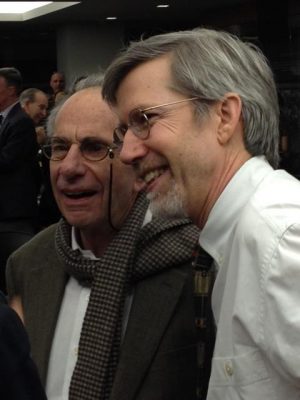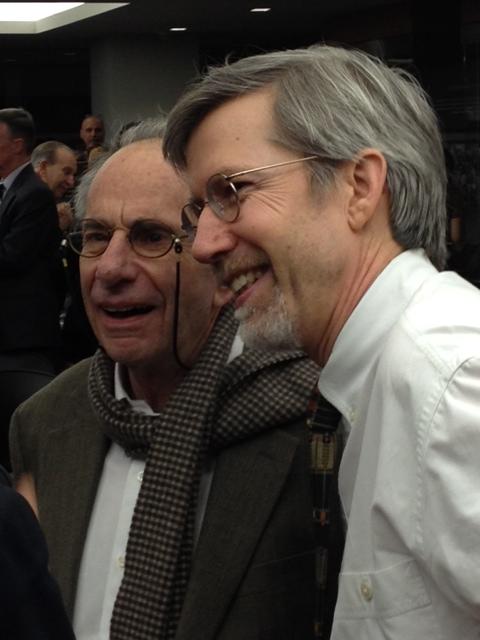
Marcus Raskin with current IPS Director John Cavanagh. Photo by E. Ethelbert Miller.
There is something special about Marcus Raskin. One becomes immediately aware of this when you hear him playing the piano. If I was a Hollywood writer, Raskin would be one of those individuals in that television series Heroes. He would have a unique gift, not the ability to walk through walls or hear other people’s thoughts but the gift and the ability to see the larger pattern in life; to understand the true purpose of being and doing.
For many of us, Marcus Raskin is a hero. He is a visionary. A man who looks at the world and realizes one can change it. For me, he has been a father, teacher and friend. I like how this man thinks. I like how he peels a question, how he bites into it. I like how this man chews a thought; a creative taste lingering on his tongue. When Raskin speaks he often sheds light on the levels and degrees of life.
Last year at IPS we started doing “The Raskin Readings.” This consisted of IPS fellows reviewing the work written by Raskin and selecting a few pages in order to lead an afternon discussion. It’s amazing how much Raskin has written over the years. I imagine his paper will reveal how certain ideas were formed, matured and took flight. There will probably be items in his papers that show how some of his ideas were too young to go steady.
I think it will be important in the future to admire Raskin as a builder and architect. It will be important to study the man as well as the Institute for Policy Studies.
Why do we save things? Why donate papers?
The past always seems sexier after it undresses. We have a tendency to leave papers and documents behind like discarded clothes. Yet didn’t we strut in the old wares once? I wonder what Marcus Raskin’s papers will tell us about the 1960s, about nuclear disarmament, National Security, Civil Rights, poverty and social inequality. What will his papers tell us about a year like 1968?
I think we save things in order to determine what should be the blueprint for the future.
I think we save things because life is filled with victories and defeats, and sometimes we confuse the two.
I think we save things because it measures the length – the shadow one person can cast.
We donate papers because we understand the importance of sharing and the hope that what one man might have owned can now be shared with others.
Maybe all of Marcus Raskin’s work should be filed under the heading – For The Common Good.
I know he once said:
Winter is always coming, the children are always sick, loved ones are always dying before their time.
Yet, somehow we survive and that is why we donate papers. It is a way of reaching the future.
It is the preservation of memory. With memory comes meaning. This is what the blues singer struggles to achieve. A sense of meaning carved out of the tree of life.
In his book BEING AND DOING published in 1973 by Beacon Press, Raskin spoke of the need to develop a philosophy of reconstruction in politics and public policy. The task of such a philosophy was to break the bounds of absurdity and develop new moods of thought.
Hopefully the material given by Raskin to the Gelman Library will help some future student or scholar develop an analysis that will help create new and better structures not only for institutions but for individuals, for lovers and the sons and daughters of lovers.
What Raskin has done today is plant more seeds. Somewhere ahead of us is the new harvest. Because he has been an excellent teacher and mentor, we know the harvest will be good and the people will be fed.
Let not the present American hunger only find us serving and consuming tea. The life of Marcus Raskin is a song of celebration. Just as Raskin’s fingers mastered the genius of many composers, so too might future patrons of this library benefit from his generosity and provide us with a new music and a chorus for change.
There is much Raskin to be read.
Let me conclude my brief remarks by simply saying that the staff here at the Gelman Library is exceptional. There is much good news coming out of this place. It’s beginning to feel sacred.
Not far from here, Mahalia Jackson listening to Martin Luther King, Jr at the March on Washington, reminded him to tell the people about the dream. “Tell them about the dream Martin. Tell them about the dream” she said.
This evening as we honor Marcus Raskin, I feel the need to say –
Tell us about your dream Marcus. Tell us about your dream.
For more from E. Ethelbert Miller, visit his blog at http://eethelbertmiller1.blogspot.com/
